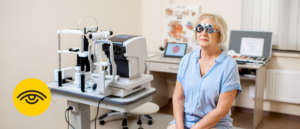

Elderly eye health – encouraging your parents to get their eyes checked
Just like physiotherapy and regular doctor appointments, elderly eye health is an important aspect to growing older. We know it can be difficult to encourage


There’s a whole lot of misunderstanding around vision problems. From “carrots improve night vision”, to “it’s fine to wear reading glasses 24/7”, there’s certainly a lot of hearsay about good eyesight. Which is true and which is just a myth?
And how do you sort the fact, from the fiction?
This quick guide will help you wade your way through the myths.
80 per cent of vision problems worldwide are avoidable or curable.
A lot of research has gone into understanding the way our eyes work and the conditions that affect our vision, so we know more about eye health than ever before. The important thing is early detection – keeping up with your regular bi-annual check-ups will ensure you are treated and cured early on.
Some people believe their eyesight was fine until they started wearing glasses. They say that once their eyes become reliant on glasses, they get weaker. There’s no fact behind this at all. The signals between your eyes and your brain allow you to distinguish between good and bad vision. So for a lot of people, you don’t realise your vision is bad until you’ve tried prescription glasses.
We all know too much time out in the sun can negatively impact a number of parts of the body, including your eyes. Excessive direct sunlight can foster conditions like cataracts and macular degeneration. So, in some cases, farmers and tradies may be more likely to develop vision problems than office workers. However, there are ways to combat prolonged sun exposure. Conservative clothing that covers your body, a hat and of course sunglasses are all effective ways to protect your body and eyes from the sun’s rays.
Sadly no, carrots don’t help you see better at night – it’s just an old wives’ tale to encourage children to eat their vegetables. However, there is a tiny little bit of truth to this myth. While carrots specifically don’t improve your vision, they do contain vitamin C. Both vitamins C and A can help keep your eyes healthy. So don’t cut out fruit and veggies, they’re important!
Your eye health can be affected by a range of lifestyle choices. Smokers are twice as likely to experience conditions like dry eye as a result of the habit. It’s not guaranteed that you will suffer from this or any other eye-related problems, but the chances are much higher than if you were a non-smoker.
As we age, our eyesight (along with many other parts of our bodies!) deteriorate. Since this decline is gradual, most people don’t notice it until they have their eyes examined. With a new set of prescription glasses, catering to your specific needs, you are able to see a real difference in your eyesight.
Remember to be careful with your vision – but also don’t believe everything you hear!
To check in on your eye health, book online here. You can also call us on 02 6571 1121 if you want to know more about anything mentioned above.


Just like physiotherapy and regular doctor appointments, elderly eye health is an important aspect to growing older. We know it can be difficult to encourage


Astigmatism is caused by the cornea or lens of the eye not being perfectly curved, resulting in blurred vision. How this affects you is varied


When you use your eyes to concentrate on something for a long period of time the common result is eye strain. Tired, sore, and itchy
Monday 9am–5:30pm
Tuesday 9am–5:30pm
Wednesday 9am–5:30pm
Thursday 9am–6:00pm
Friday 9am–5:30pm
Saturday Closed
Sunday Closed